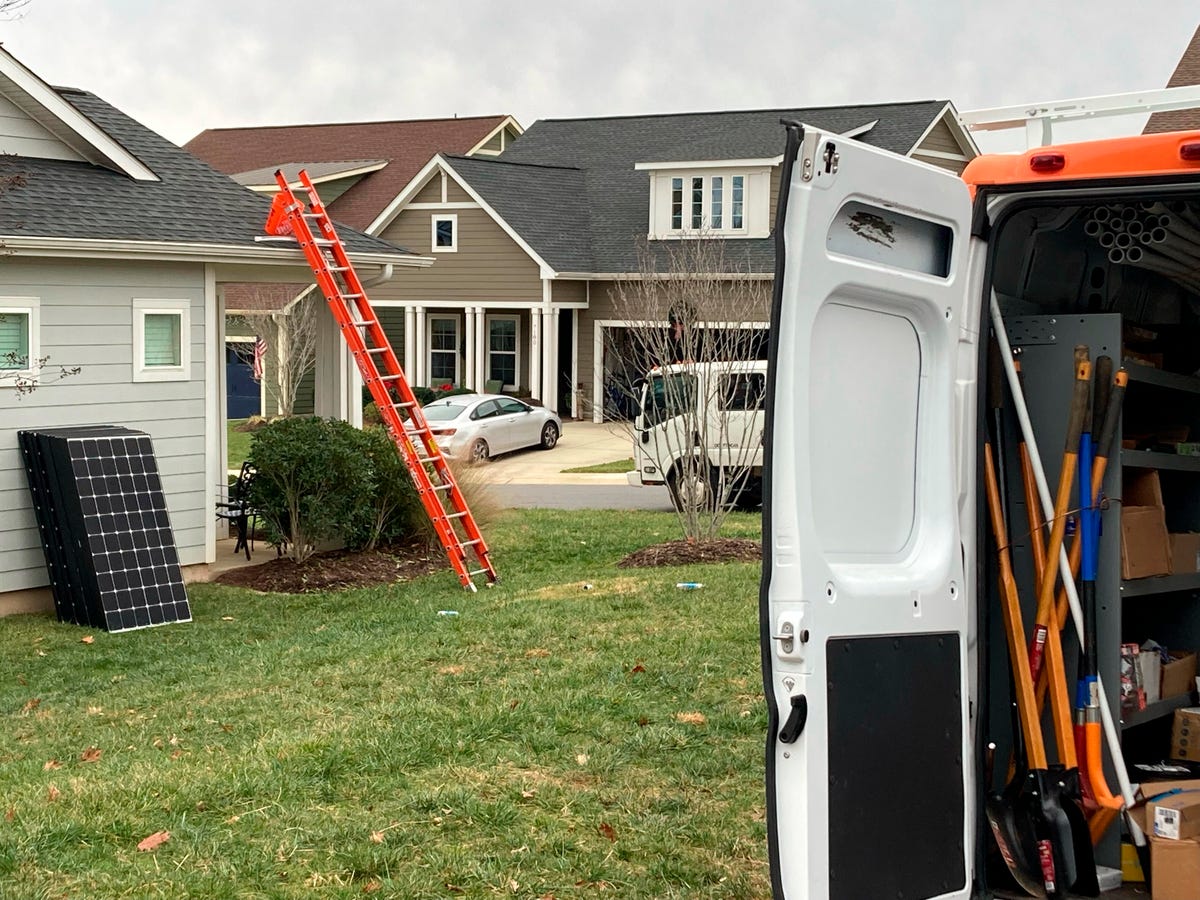How AI Will Make Residential Solar Installations Cheaper and Faster – CNET
There’s hardly an industry that artificial intelligence hasn’t touched by this point — and residential solar is no exception.
That’s good news for solar customers: AI promises to make solar installations faster and potentially cheaper, while also improving the performance of a home energy system over time.
In the not-so-distant future, AI could help you design your solar system, analyze your property, optimize a home battery (if you have one) and even predict maintenance costs after the panels are installed.
Can solar panels save you money?
Interested in understanding the impact solar can have on your home? Enter some basic information below, and we’ll instantly provide a free estimate of your energy savings.
“The [solar] system’s justified without the AI, and the AI is just going to keep on increasing the consumer’s value,” said Frank Magnotti, CEO at Electriq Power, an energy storage company.
Here’s what you need to know about the potential benefits, and risks, of AI’s increasing role in residential solar.
What improvements can AI do for the residential solar industry right now
AI has gotten a lot of buzz lately, but the term refers to a broad range of technologies, according to Magnotti. He says there are two main types of AI that are important for solar. One is the Chat-GPT-style bot that many of us are now familiar with, and the other is the engineering-type AI that can do complex optimization for a home energy system.
The chat-style AI can already play a role in the front end of the solar process, assisting or even replacing the traditional salesperson, Magnotti said. And the engineering side of AI acts as the crucial “smarts” embedded in a system.
That engineering piece is already prominent in the home energy and solar industry. Anyone with a home battery already has software that is optimizing performance, which is itself a type of AI. Some customers may want to “set it and forget it,” but for those who want more of a hand in deciding how their home energy system works, AI can already do that.
What improvements can AI do for the solar industry in the future?
In the long-term, AI has a lot of room to grow in the solar industry.
Magnotti sees a future in which AI plays a part in nearly every step of the process, from customer acquisition to installation and maintenance.
AI chatbots can help handle customers in what is currently an extremely labor-intensive piece of the solar process. The technology could also improve the design of solar systems that are tailored to what a customer wants — say, maximum net-metering income, or lowest installation cost.
Magnotti says the software in home energy systems will also improve, and develop the ability to use ever-more-specific data, like local weather predictions, to optimize performance. “AI [can include] all the predictive weather forecasts — is your grid going to go down — but very localized to you, as opposed to generic information,” he said.
Can AI reduce the cost of residential solar panel systems?
In a word: Yes.
One of the most labor- and cost-intensive pieces of residential solar is customer acquisition, Magnotti said. Companies sometimes spend thousands of dollars to acquire and close each customer, and that cost is baked into the price of solar.
If AI chatbots take care of much of those initial customer interactions, it could drastically reduce labor costs for installers. AI’s help in the design process can also reduce costs by gathering more information about a customer’s specific roof, reducing design errors and speeding up the entire thing.
Taken together, Magnotti said, AI can take a chunk out of some of the major expenses involved in solar installations, meaning the potential for lower costs for customers too.
Expected applications of AI in the residential solar energy sector
We’ve touched on some already, but here’s a detailed breakdown of where AI could help the solar industry.
Customer acquisition
This is an area where AI chatbots can really excel. Magnotti said AI might become a customer’s first point of contact with a solar company, allowing them to ask questions and get important information before ever talking to a real person. “You can really optimize the sales efficiency,” he said.
Pre-construction planning
Once a homeowner has entered the planning process, AI could churn out real-time design options for customers. Depending on what you’re optimizing for (low cost, maximum energy production, resilience or something else entirely), AI could model it for you.
“Here’s where AI can play a bigger role, because there’s a lot of predictive scenario planning,” Magnotti said.
Site examination
Usually a solar installation involves a home visit from the solar company and could be slowed down by how busy they are. Magnotti said AI could step in here too by running a remote drone flyover of your home and gathering information about the installation site without relying on existing satellite imagery or sending humans to your home to inspect conditions.
Supply and demand predictions
Once a customer has installed solar, the AI software embedded in the system (especially if it’s paired with a home battery) can pull a lot of weight. Again, software could optimize for whatever a customer wants: solar production, energy storage, net-metering income or resilience during a power outage. “This also is AI with all the predictive and learning algorithms,” Magnotti said.
Predictive maintenance
Maintenance on solar is easy to forget about. “This long-term maintenance matters a lot, and generally end consumers don’t put that in their calculations,” Magnotti said. The details are less defined here, but Magnotti said AI could help customers not only predict when their system will need maintenance but potentially reduce the costs as well.

A solar panel installation taking place in North Carolina. Experts say future applications of AI could help streamline the installation process and speed up the process and costs.
Risks associated with scaling AI technology across the residential solar energy sector
Magnotti sees little risk in AI’s growing role in solar. In fact, he says whatever risk there might be in letting an AI make decisions will only decrease as time goes on.
“The bigger the scale, the lower the risk,” he said, because AI “learns” over time as it consumes more information. “The more data that you have, the better your AI is going to be…This is just going to get better and better, it’s not going to get worse with scaling.”
What should solar panel fence-sitters do with this information?
It’s true that AI is going to improve — and potentially lower the cost of — solar installations, but that doesn’t mean you should wait to buy.
“There’s no need to wait, and it’s only going to get better, and your economics are going to keep getting better,” Magnotti said.
Plus, existing customers are likely to benefit from continued improvements in AI software. If you have a home battery paired with your solar system, for example, your battery’s computer could get automatic software updates every time the AI improves, without any costs or new installations on your end. In other words: The hardware won’t change very much with AI, and you can always get a software update.
“The economics are there for solar right now,” Magnotti said. “You don’t have to wait.”
Editors’ note: CNET is using an AI engine to help create some stories. For more, see this post.
This post was originally published on 3rd party site mentioned in the title of this site


